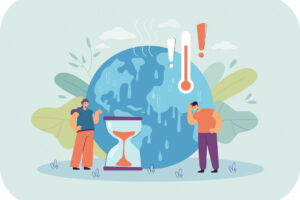Climate change and health

Climate change is having profound and far-reaching effects on human health, the World Health Organization (WHO) warns. It contributes to death and illness through increasingly frequent extreme weather events — such as heatwaves, storms, and floods — as well as the disruption of food systems; rising cases of zoonotic, water-, food-, and vector-borne diseases; and growing mental health challenges.
In simple terms, climate change refers to long-term shifts in temperatures and weather patterns. While these changes can occur naturally — such as through solar activity or volcanic eruptions — human activities have been the dominant driver since the 1800s. The primary culprit? The burning of fossil fuels like coal, oil, and gas, which releases greenhouse gases such as carbon dioxide and methane. These gases trap the sun’s heat in the atmosphere, causing the planet to warm like a blanket wrapped around it.
Today, around 3.6 billion people live in areas highly vulnerable to climate change. Between 2030 and 2050, the WHO estimates that climate change will cause an additional 250,000 deaths annually, from causes like undernutrition, malaria, diarrhea, and heat stress. The projected direct health-related costs (excluding those related to other sectors like agriculture and water supply) are estimated at $2-4 billion per year by 2030. Regions with under-resourced health systems — often in developing countries — face the greatest risks.
But climate change doesn’t just affect physical health. It also threatens many of the social determinants of health — livelihoods, access to care, equality, and support systems. The burden falls most heavily on vulnerable groups: women, children, the poor, the elderly, migrants, and those with chronic illnesses.
To avoid catastrophic health consequences, the WHO emphasizes that global warming must be limited to 1.5°C. Reducing emissions through improved transport, food systems, and energy choices can yield immense health benefits, especially by reducing air pollution.
PHILIPPINE RESPONSEThe Philippines is a signatory to the Paris Agreement, which aims to limit the global temperature rise. The country has also endorsed the COP28 UAE Declaration on Climate and Health and is part of the WHO-led Alliance for Transformative Action on Climate and Health — all steps toward building climate-resilient health systems.
At home, the Department of Health (DoH) has been leading multistakeholder efforts to safeguard health from climate impacts. In line with the Climate Change Act of 2009, the DoH sits on the Climate Change Commission’s advisory board and chairs the Inter-Agency Committee on Environmental Health. The DoH also plays a key role in the National Climate Change Action Plan (2011-2028) and the National Adaptation Plan (2023-2050).
Most notably, in January, the DoH established the Health and Climate Change Office (HCCO) — a dedicated unit tasked with coordinating a whole-of-society response to climate threats while promoting sustainable, low-carbon, and climate-resilient health systems.
The HCCO is responsible for:
• Embedding climate considerations into health policies and programs;
• Integrating health concerns into broader climate strategies and plans;
• Leading cross-sector collaboration to protect public health from climate risks;
• Developing a unified Health and Climate Change Program across DoH units;
• Crafting a Health and Climate Change Roadmap and Action Plan, with clear short-, medium-, and long-term targets.
BIOPHARMACEUTICAL INDUSTRY’S ROLEInnovative biopharmaceutical companies are also stepping up — not only by addressing the health challenges posed by climate change, but also by minimizing their own environmental footprints. These companies are:
• Developing new technologies to detect, treat, and prevent climate-sensitive diseases;
• Reducing emissions across their operations and supply chains;
• Investing in renewable energy and energy efficiency;
• Lowering water use and increasing recycling and sustainability practices;
Together with the DoH and other partners, the biopharmaceutical industry is committed to ensuring that the health impacts of climate change are addressed with urgency, innovation, and shared responsibility.
Teodoro B. Padilla is the executive director of Pharmaceutical and Healthcare Association of the Philippines which represents the biopharmaceutical medicines and vaccines industry in the country. Its members are in the forefront of research and development efforts for COVID-19 and other diseases that affect Filipinos.



